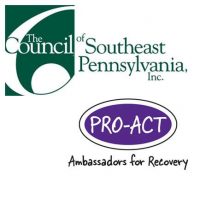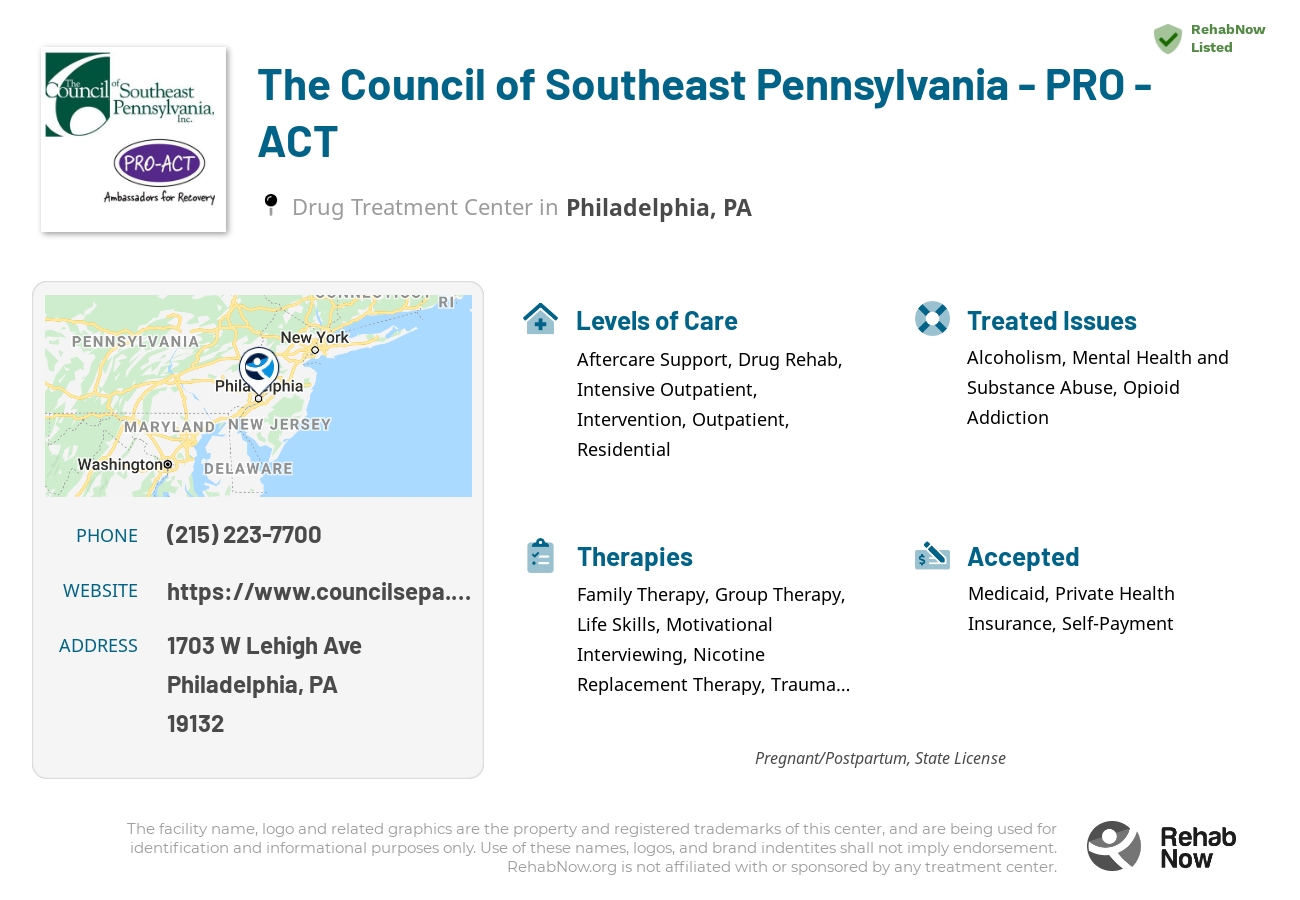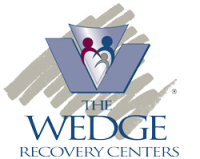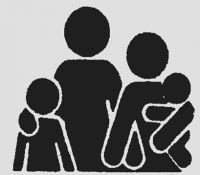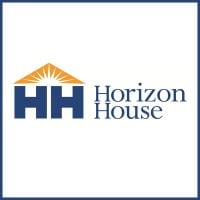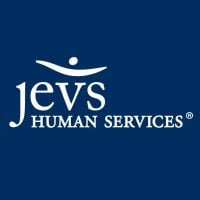The Council of Southeast Pennsylvania - PRO - ACT
Drug Rehab Center in Philadelphia, Pennsylvania
The Council of Southeast Pennsylvania - PRO - ACT is an addiction treatment facility that offers various levels of care, aftercare support and intervention services, and is accredited by state license and accepts private health insurance.
About This Philadelphia, PA Facility
The Council of Southeast Pennsylvania - PRO - ACT is a renowned drug treatment facility located in Philadelphia, PA. This facility holds the prestigious accreditation of being licensed by the state, ensuring that they meet the highest standards in providing treatment for alcoholism, opioid addiction, dual diagnosis, and drug addiction. They offer a wide range of services for individuals suffering from these conditions, including aftercare support, drug rehab, intensive outpatient programs, interventions, outpatient programs, and residential levels of care. As an affiliate of The Council of Southeast Pennsylvania, this facility strives to provide comprehensive and effective treatment options for those struggling with addiction.
The Council of Southeast Pennsylvania - PRO - ACT is committed to offering diverse services to individuals facing addiction and substance abuse issues. Their programs go beyond just providing treatment, aiming to provide a holistic approach to recovery. Through aftercare support, individuals can receive ongoing assistance and guidance even after completing their treatment. They offer drug rehab services to help individuals detoxify and overcome their physical addiction. Additionally, their intensive outpatient programs provide structured therapy and support while allowing individuals to maintain their daily responsibilities. They also specialize in dual diagnosis treatment for individuals with co-occurring mental health disorders. With a range of services available, The Council of Southeast Pennsylvania - PRO - ACT ensures that individuals receive the personalized care they need to achieve long-lasting recovery.
Genders
Ages
Modality
Additional
Accreditations
State License
Conditions and Issues Treated
Opioid addiction involves addiction to legal or illegal opioids. It may happen very quickly with any opioid use. Sometimes within a matter of days. Opioid addiction is a known as a high-risk factor for future heroin addiction.
Opioid withdrawal can be extremely uncomfortable and lead the user to continue to use even if they want to quit. Stopping using an opioid requires careful medical observation. Sometimes the withdrawal can persist for many weeks, which can put the user at a high risk for relapse.
It is recommended to receive inpatient treatment and a medically supervised detox like those offered at The Council of Southeast Pennsylvania - PRO - ACT in Philadelphia, PA, PA, to manage the withdrawal process while learning lasting tools to maintain recovery. In some circumstances medications can be used to manage opioid addiction.
Levels of Care Offered
This center offers a variety of custom treatment tailored to individual recovery. Currently available are Aftercare Support, Drug Rehab, Intensive Outpatient, Intervention, Outpatient, Residential, with additional therapies available as listed below.
Intensive outpatient programs are an integral part of the continuum of care for people addicted to drugs and alcohol. Most intensive outpatient programs in Philadelphia, PA comprise a 3-hour session three times a week. Usually, the intensity of these programs diminishes over time. These programs offer a range of services, including counselling, medical treatment, and monitoring alcohol and drug use. The programs are ideal for people who do not need treatment at an inpatient or residential facility and continue to need extended care and support.
Outpatient treatment is treatment that occurs when a patient is not checked into a rehab facility. The patient may show up for therapy sessions, go through detox and engage in other therapies to help them recover. However, they will do so while they live at home in Pennsylvania.
Outpatient therapy provided by The Council of Southeast Pennsylvania - PRO - ACT is usually recommended as a follow up to inpatient therapy. It helps patients adapt to their normal lives after treatment. In some cases, it can also be an alternative to inpatient treatment. People may choose this route if they are unable to leave their jobs, children or if they don’t have the money for inpatient treatment. However, inpatient treatment is the best way to recover from addiction.
Residential treatment programs are those that offer housing and meals in addition to substance abuse treatment. Rehab facilities that offer residential treatment allow patients to focus solely on recovery, in an environment totally separate from their lives. Some rehab centers specialize in short-term residential treatment (a few days to a week or two), while others solely provide treatment on a long-term basis (several weeks to months). Some offer both, and tailor treatment to the patient’s individual requirements.
An intervention is a meeting held by families and friends of the addicted party, managed by The Council of Southeast Pennsylvania - PRO - ACT. It lets the person know that their loved ones are concerned about them. It is intended to make the addicted party agree to get help.
Interventions are often hosted by a mental health professional in Pennsylvania who knows how to communicate with people dealing with addiction. These intervention services can make all the difference when it comes to getting loved ones to agree to treatment.
Aftercare support involves the support given to a Philadelphia, Pennsylvania patient after they complete treatment. It helps them adjust to normal life. It may include setting them up in a halfway house and enrolling them in programs like Narcotics Anonymous (NA) and Alcoholics Anonymous (AA). The Council of Southeast Pennsylvania - PRO - ACT‘s patients may also be provided with career training to help them get back into the job force.
The Council of Southeast Pennsylvania - PRO - ACT‘s Therapies & Programs
Family therapy is a set of therapeutic approaches that assumes that the entire family is a system. It utilizes the strengths and resources of the family to help the patient refrain from resorting to substance abuse. It helps to repair relationships and improve communication between family members.
Group therapy happens at The Council of Southeast Pennsylvania - PRO - ACT in a controlled group environment, as opposed to a one-on-one setting. It supports Philadelphia, PA patients’ recovery by offering a sense of comfort and letting them know that they are not alone. Through shared conversations, patients also learn to develop faith and understanding and gain insight on their addictions.
Unresolved trauma is often a key reason why many patients resorted to substance abuse. Trauma therapy refers to treatment wherein specialist therapists help the patients to resolve the trauma that led the patients to substance abuse. The trauma could be physical abuse, sexual abuse, war, natural disasters, divorce, accident, loss of a loved one, etc. Thinking of these traumatic events causes emotional disturbances like anxiety, depression and results in addiction. If trauma is the primary cause of substance abuse, then both issues must be addressed. Otherwise, there is a risk of relapse. Trauma therapy also improves the cognitive functions and provides long term benefits.
Cognitive behavioral therapy (CBT) is a way of addressing concerns through talking. It can be used in individual counseling sessions. Talking through issues with professionals at The Council of Southeast Pennsylvania - PRO - ACT can identify sources of discomfort or unhealthy thoughts. It is a way of learning about yourself and your individual perceptions. CBT is a healthy way of addressing some behaviors which may be bringing unintended consequences in your life.
Payment Options Accepted
For specific insurance or payment methods please contact us.
Is your insurance accepted?
Ask an expert, call (888) 674-0062
The Council of Southeast Pennsylvania Associated Centers
Discover treatment facilities under the same provider.
- PRO - ACT Recovery Training Center in Philadelphia, PA
- The Council of Southeast Pennsylvania - Outpatient in Doylestown, PA
- The Council of Southeast Pennsylvania - Criminal Justice Services in Bristol, PA
- The Council of Southeast Pennsylvania - Women's Recovery Community Center in Doylestown, PA
Learn More About The Council of Southeast Pennsylvania Centers
Additional Details
Specifics, location, and helpful extra information.
Philadelphia, Pennsylvania 19132 Phone Number(215) 223-7700 Meta DetailsUpdated November 25, 2023
Staff Verified
Patient Reviews
There are no reviews yet. Be the first one to write one.
Philadelphia, Pennsylvania Addiction Information
Pennsylvania ranks 14th in the nation for drug-related deaths. More than 10% of all deaths in Pennsylvania have been related to drugs and alcohol. 30% of Pennsylvania youth reportedly drink alcohol monthly, with more than 20,000 teenagers having an alcohol problem. The rate of opioid misuse in Pennsylvania is double the national average.
Drug addiction and abuse are a big problem in Philadelphia, Pennsylvania. According to recent statistics, about 73,000 people in Philadelphia struggle with drug addiction. This means that about 7.5% of the population is addicted to drugs. Philadelphia also has one of the highest overdose rates in the country, with about four deaths per 100,000 people. It is important to choose a program that fits the individual's needs and addiction severity.
Treatment in Nearby Cities
- Willow Grove, PA (10.6 mi.)
- Mount Pocono, PA (78.7 mi.)
- Bala-Cynwyd, PA (3.9 mi.)
- Columbia, PA (71.3 mi.)
- Westfield, PA (182.1 mi.)
Centers near The Council of Southeast Pennsylvania - PRO - ACT
The facility name, logo and brand are the property and registered trademarks of The Council of Southeast Pennsylvania - PRO - ACT, and are being used for identification and informational purposes only. Use of these names, logos and brands shall not imply endorsement. RehabNow.org is not affiliated with or sponsored by The Council of Southeast Pennsylvania - PRO - ACT.
